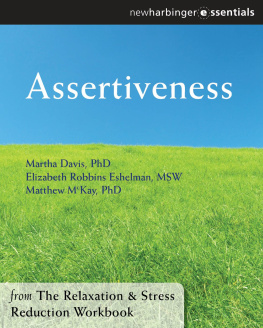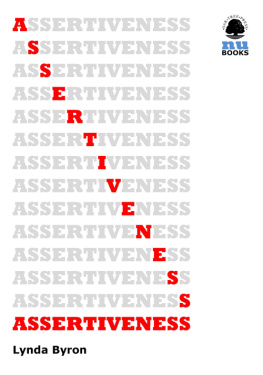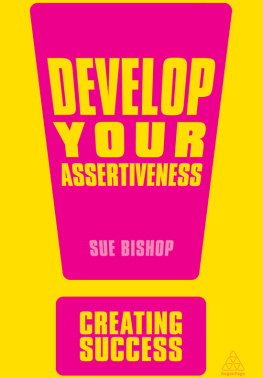Martha Davis - Assertiveness: Chapter Singles
Here you can read online Martha Davis - Assertiveness: Chapter Singles full text of the book (entire story) in english for free. Download pdf and epub, get meaning, cover and reviews about this ebook. year: 2008, publisher: New Harbinger Publications, genre: Home and family. Description of the work, (preface) as well as reviews are available. Best literature library LitArk.com created for fans of good reading and offers a wide selection of genres:
Romance novel
Science fiction
Adventure
Detective
Science
History
Home and family
Prose
Art
Politics
Computer
Non-fiction
Religion
Business
Children
Humor
Choose a favorite category and find really read worthwhile books. Enjoy immersion in the world of imagination, feel the emotions of the characters or learn something new for yourself, make an fascinating discovery.
- Book:Assertiveness: Chapter Singles
- Author:
- Publisher:New Harbinger Publications
- Genre:
- Year:2008
- Rating:4 / 5
- Favourites:Add to favourites
- Your mark:
- 80
- 1
- 2
- 3
- 4
- 5
Assertiveness: Chapter Singles: summary, description and annotation
We offer to read an annotation, description, summary or preface (depends on what the author of the book "Assertiveness: Chapter Singles" wrote himself). If you haven't found the necessary information about the book — write in the comments, we will try to find it.
Assertiveness: Chapter Singles — read online for free the complete book (whole text) full work
Below is the text of the book, divided by pages. System saving the place of the last page read, allows you to conveniently read the book "Assertiveness: Chapter Singles" online for free, without having to search again every time where you left off. Put a bookmark, and you can go to the page where you finished reading at any time.
Font size:
Interval:
Bookmark:
Publishers Note
This publication is designed to provide accurate and authoritative information in regard to the subject matter covered. It is sold with the understanding that the publisher is not engaged in rendering psychological, financial, legal, or other professional services. If expert assistance or counseling is needed, the services of a competent professional should be sought.
The material in chapter 13 that is based upon the work of Michelle G. Craske and David H. Barlows Master Your Anxiety and Worry, 2nd ed. (2006) pages 99109 is used by permission of Oxford University Press.
Distributed in Canada by Raincoast Books
Copyright 2008 by Martha Davis, Elizabeth Robbins Eshelman, and Matthew McKay
New Harbinger Publications, Inc.
5674 Shattuck Avenue
Oakland, CA 94609
www.newharbinger.com
All Rights Reserved
ePub ISBN: 9781608820702
Acquired by Tesilya Hanauer; Cover design by Amy Shoup;
Edited by Kayla Sussell
The Library of Congress has cataloged the print edition as:
Davis, Martha, 1947
The relaxation and stress reduction workbook / Martha Davis, Elizabeth Robbins Eshelman, and Matthew McKay. -- 6th ed.
p. cm.
Includes bibliographical references and index.
ISBN-13: 978-1-57224-549-5 (pbk. : alk. paper)
ISBN-10: 1-57224-549-2 (pbk. : alk. paper) 1. Stress management. 2. Relaxation. I. Eshelman, Elizabeth Robbins. II. McKay, Matthew. III. Title.
RA785.D374 2008
616.98--dc22
2008003637

This comprehensive workbook deserves to be in the library of every active therapist, but it shouldnt be left on the shelf! Once again, the authors have empowered the reader with straightforward instructions on every major approach to stress management known. From worry to chronic headaches to information overload, here is your one-stop guide to recovery.
R. Reid Wilson, Ph.D., author of Dont Panic: Taking Control of Anxiety Attacks
This text remains, after twenty years, the clearest, best-organized, and most readable book on stress management. It has achieved the status of the classic self-help reference in the field.
Edmund J. Bourne, Ph.D., author of The Anxiety and Phobia Workbook, Coping with Anxiety, and Beyond Anxiety and Phobia
An exemplary book on stress. It is lucidly written, rationally ordered, and comprehensive, and each section is densely packed with instructions and exercises which make the workbook easy to practice.
Somatics Magazine: Journal of the Mind/Body Arts and Sciences

Assertiveness
In this chapter you will learn to:
- Evaluate your current patterns of communication
- Differentiate between aggressive, passive, and assertive styles of communication
- Examine mistaken traditional assumptions and your assertive rights
- Express your feelings and opinions, set limits, and initiate change
- Use nonverbal assertive communication
- Listen assertively
- Avoid manipulation
Andrew Salter (1949) initially described assertiveness as a personality trait. It was thought that some people had it, and some people didnt, just like extroversion or stinginess. But Wolpe (1958) and Lazarus (1966) redefined assertiveness as expressing personal rights and feelings. They found that nearly everybody could be assertive in some situations, and yet be totally ineffectual in others. The goal of assertiveness training is to increase the number and variety of situations in which assertive behavior is possible, and decrease occasions of passive collapse or hostile blowup.
You are assertive when you stand up for your rights in such a way that the rights of others are not violated. Beyond just demanding your rights, assertiveness implies that you can: express your personal likes and interests spontaneously; talk about yourself without being self-conscious; accept compliments comfortably; disagree with someone openly; ask for clarification; and you can say no. In short, when you are an assertive person, you can be more relaxed in interpersonal situations.
Some people think that assertiveness training turns nice people into irascible complainers or calculating manipulators. Not so. Its your right to protect yourself when something seems unfair. You are the one who best understands your discomfort levels and your essential needs.
How you interact with people can be a source of major stress. Assertiveness training can reduce that stress by teaching you to stand up for your legitimate rights, without bullying others or allowing them to bully you. You can use assertive communication to reduce conflict and build strong, supportive relationships.
Before reading any further, write down how you would typically respond to the following problem situations:
- You finish shopping in the market, and after you walk out you discover that the change is three dollars short.
I would:
__________________________________________________
__________________________________________________
__________________________________________________
__________________________________________________
- You order a rare steak and it arrives medium-well done.
I would:
__________________________________________________
__________________________________________________
__________________________________________________
__________________________________________________
- Youre giving a friend a lift to a meeting. The friend keeps puttering around for half an hour and you realize that you will arrive late for the meeting.
I would:
__________________________________________________
__________________________________________________
__________________________________________________
__________________________________________________
- Youve been looking forward all week to seeing a particular movie, and your companion informs you that he or she wants to see a different movie.
I would:
__________________________________________________
__________________________________________________
__________________________________________________
__________________________________________________
- Youre relaxing watching TV after a long, hard day. Your spouse pops in, list in hand, and says, I thought youd never get here. Quick, go out and pick up these things from the store.
I would:
__________________________________________________
__________________________________________________
__________________________________________________
__________________________________________________
- While you wait for the clerk to finish with the customer ahead of you, another customer comes in and the clerk starts to wait on him before you.
I would:
__________________________________________________
__________________________________________________
__________________________________________________
__________________________________________________
After you have written down what you would do in these problem situations, set your responses aside. They will be put to use shortly.
Font size:
Interval:
Bookmark:
Similar books «Assertiveness: Chapter Singles»
Look at similar books to Assertiveness: Chapter Singles. We have selected literature similar in name and meaning in the hope of providing readers with more options to find new, interesting, not yet read works.
Discussion, reviews of the book Assertiveness: Chapter Singles and just readers' own opinions. Leave your comments, write what you think about the work, its meaning or the main characters. Specify what exactly you liked and what you didn't like, and why you think so.













